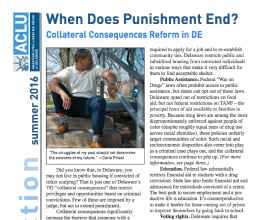The ACLU of Delaware recently filed addressing the application of the Fourth Amendment in the context of computer searches.
In the case in question, warrants were issued authorizing seizure of “any and all data… on any items seized,” despite state-submitted affidavits specifying that the state was searching for “evidence of written communications.” Additionally, while the state had a clearly defined time period during which the files containing evidence they sought may have been created, the warrants were unlimited as to time. The wide, unconstrained manner of the search conducted revealed files that the government had no probable cause to seize.
The Fourth Amendment forbids unconstrained searches, requiring that “no warrants shall issue, but upon probable cause, supported by Oath or affirmation, and particularly describing the place to be searched, and the persons or things to be seized.” It ensures that “those searches that are deemed necessary are as limited as possible,” only authorizing searches of specific areas and things that there is probable cause to search.
Computers, cell phones, and other electronic devices are capable of storing a vast array of personal information and files. The prospect of warrants for all of a person’s electronic data when there is only probable cause to search some of that data raises profound questions about Delawareans’ right to be free from unreasonable searches and seizures in an ever more technologically capable society.
This brief addresses:
- Whether the Fourth Amendment and the Delaware Constitution require that a search warrant for electronic data be limited to devices used during the time period in which the relevant data is believed to be created or recorded
- Whether a search for particular digital data may be conducted by examining all the data on the seized device, regardless of whether or not there is a less invasive way to conduct the search that would restrict the search to only data that is potentially relevant
The order granting ACLU-DE's participation in the case may be found here.








